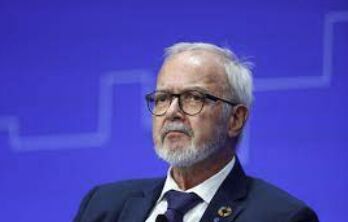EIB President Warns Successor: Funding Weapons for Ukraine Could Damage Reputation
The European Investment Bank (EIB) will face challenges as its president prepares to step down. The successor must navigate funding pressure for weapons in Ukraine while maintaining the bank's focus on environmental and social issues. The EIB is also involved in Europe's digital transition and has a renewed relationship with Latin America. President Werner Hoyer emphasized the need for a reevaluation of donor-recipient thinking, proposing a quality-check system for green investments.
The European Investment Bank (EIB) is set to face challenges as its current president, Werner Hoyer, prepares to step down at the end of December. Hoyer has warned his successor about the potential risks of bowing to pressure from certain EU member states to fund weapons for Ukraine, stating that it would harm the bank's image and credibility. The EIB, which has become one of the world's largest providers of climate finance, will play a crucial role in the reconstruction efforts in Ukraine. However, some politicians have suggested providing defense industry funding to support Ukraine on the battlefield.
Hoyer emphasized the importance of maintaining the bank's focus on environmental, social, and corporate governance (ESG) issues and cautioned against using EIB funding for ammunition purchases, stating that it would be controversial. The EIB previously redirected funding away from Russia after the annexation of Crimea in 2014 and towards Georgia, Moldova, and Ukraine.
Hoyer's replacement, expected to be either Spain's Finance Minister Nadia Calvino or Denmark's EU competition chief Margrethe Vestager, will also oversee the EIB's role in Europe's transition towards a more digitized and net-zero-carbon economy. Hoyer expressed pride in the high caliber of candidates for his succession, with five countries presenting excellent candidates. He also highlighted the EIB's renewed relationship with Latin America, signaling a new beginning for collaboration between the bank and the region. The EIB has also been actively involved in European efforts to combat deforestation in the Amazon, opening its first office in Brazil in May and issuing green and sustainable bonds.
Hoyer stressed the need for a reevaluation of the donor-recipient thinking, emphasizing the importance of considering the benefits to developing countries. He cited Bolivian President Luis Arce's openness to working with European companies on tapping the world's largest lithium reserves, with a focus on industrialization alongside resource extraction. However, Hoyer acknowledged a divide in climate finance, where developing countries face caps on resource extraction that developed economies did not. He proposed a quality-check system to prevent greenwashing and ensure that investments made through green bonds provide genuine environmental benefits.




